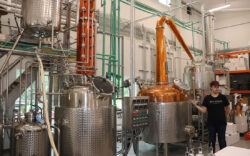Acting Athens-Clarke County Manager Niki Jones has declared a local public health emergency after “extremely high” levels of toxic chemicals were discovered in wells along Pittard Road and Star Drive on the northeast side of Athens.
The emergency declaration has allowed Jones to speed up the process of transitioning ten homes in the area from wells over to city water. The ACC Public Utilities Department contracted with Seay Plumbing and Drain Service in September to connect these residents to a nearby water line at the cost of $60,000, an expense which normally would have needed to be approved by the mayor and commission first. The commission ratified the decision at its Oct. 1 voting meeting.
The utility hookups will provide clean water to these residents in a matter of days or weeks, according to ACC staff. In the meantime, the ACC Public Utilities Department is providing them with bottled water at no charge.
What Are PFAS?
It’s possible residents of the Pittard Road area, who are mostly Black, have been drinking water contaminated with high levels of per- and polyfluoroalkyl substances (PFAS) for years, if not decades, potentially causing significant health consequences.
PFAS are sometimes called “forever chemicals” because they do not naturally break down in the environment. They’re part of a large group of industrial chemicals first discovered by the DuPont corporation in 1938. Since then, they’ve been used in a huge array of consumer products, the most famous of which is nonstick cookware coated with Teflon, a PFAS chemical. These chemicals are also used in firefighting foam, dental floss and stain-resistant carpeting, just to name a few examples.
PFAS are valuable for their ability to resist heat and to repel both grease and water. Unfortunately, PFAS are dangerous to human health, according to the U.S. Environmental Protection Agency. Long-term exposure to these chemicals can cause cancer, birth defects, decreased fertility, hormonal disruption, a higher risk of obesity and a weakened immune system.
While DuPont knew that PFAS were toxic as far back as the 1970s, the company did not share this information with the public. Environmental regulators only started realizing there may be a problem in the 2000s, and it took until April of this year for the EPA to finalize their national drinking water standard for PFAS and related chemicals.
In August 2023, about a dozen Pittard Road residents came to a meeting of the ACC Mayor and Commission to demand that the local government do more to clean up industrial pollution in their area. “Our soil and water sources are now contaminated and we are experiencing severe health consequences,” resident Kiara Trammell told the commission in 2023. “Today we demand immediate action and justice. We call for a comprehensive investigation.”
The local government had already completed an in-depth review of the available data and found no evidence of industrial contamination along Pittard Road, despite the proximity to a factory originally owned by DuPont (later, Invista) that produced textiles from the 1970s until 2019.
The Georgia Environmental Protection Division visited Pittard Road in 2005 to do well tests and other screenings. It found no evidence of industrial contamination in the wells whatsoever. Environmental regulators left the area believing there were no issues with contamination. But there was a big blind spot in their investigation—they didn’t test for PFAS. Scientific evidence of PFAS toxicity was still accumulating, and regulators did not realize it was an issue. Furthermore, convenient tests for the chemicals had not yet been developed, which would have made testing for it difficult and costly.
When residents heard there was no contamination, they refused to accept it. People living along Pittard Road blamed the old DuPont plant for cancers and other health issues they had been dealing with for years. In 2023, residents told the ACC Commission that they counted 31 cases of cancer in their neighborhood, which they believed were due to contamination of their soil and water by DuPont.
However, the number of cancers has not been verified, and some of the known cancers were breast cancers found in related women. Some of these women never lived on Pittard Road, which suggests a genetic predisposition in their family. To date, no industrial soil contamination has ever been discovered in their neighborhood.
Nothing was done to clean up the wells along Pittard Road back in 2005. Pittard Road residents feel that the government has ignored their plight for decades, even though they had insisted something was wrong the entire time. “I knew years ago that there might be something in the water. I’ve known for a while,” Star Drive resident Markell Allen told Flagpole. “I knew they was gonna have to do something about it eventually, it was just a matter of when they was gonna get to it.”
New Tests Reveal Chemicals
After persistent advocacy by the Pittard Road community, Mayor Kelly Girtz decided to reach out to the Southern Environmental Law Center for help.
“As a local government, we lacked regulatory authority over people’s well water and to some degree, we had limited technical expertise,” Girtz said. “Given the level of understandable institutional distrust around governmental units, I thought that maybe an outside advocacy group would be best situated to gain trust with the community.”
Girtz contacted April Lipscomb, an attorney with the Southern Environmental Law Center, in August 2023, shortly after Pittard Road and Star Drive residents packed City Hall to voice their concerns. Lipscomb held a public forum at New Grove Baptist Church to listen to the residents and hear their stories. After this meeting, the Southern Environmental Law Center gathered together the funding they needed to test eight wells in the area for PFAS and related chemicals. That’s when Lipscomb discovered that the wells were heavily contaminated.
“All eight wells that we tested have concentrations of [PFAS]… that exceed [EPA’s strictest health standard],” Lipscomb wrote to Girtz on Aug. 21. “Nearly all wells also showed concentrations of [PFAS] that exceed [EPA’s less strict regulatory limit] for public drinking water systems, as well as high concentrations of other types of [PFAS] that exceed [EPA standards]. In plain English, these residents are currently drinking unsafe levels of toxic industrial chemicals, and they have likely been drinking these contaminants for decades.”

Lipscomb held another public meeting at New Grove Baptist Church to inform the residents of her findings. She said Pittard Road residents reacted with a mix of outrage and relief.
“In the meeting when I shared the results, there was almost a sense of relief that they finally knew that there was a problem. They had always suspected there was some kind of contamination, and now they finally had at least some answers,” Lipscomb said. “But it’s not a positive thing, they were still very dismayed, very upset to learn that industrial chemicals were in their drinking water.”
Lipscomb applauded the ACC government “for stepping up and doing the right thing” to connect these residents to city water rapidly after learning of the contamination. Residents will be connected free of charge, and they will pay nothing for their water for six months.
“I have so much respect and admiration for this community that banded together,” Lipscomb said. “They knew something was wrong and they did not give up in their quest for answers. This is what happens when you have the drive and the community will to actually get something done. I’m so grateful that they, that Mayor Girtz reached out to SELC so that we could help get this community some of the answers that they desperately wanted.”
According to ACC Sustainability Officer Mike Wharton, Athens’ municipal water had no detectable levels of PFAS when it was last tested in 2022. To stay in compliance with new regulations from the Biden administration, municipal water supplies across the country will need to be tested for PFAS every year going forward, with mandatory testing starting in three years.
“There’s still a lot more work to be done in pinpointing exactly where the PFAS came from, how long these residents have been exposed and whether any of the health effects that they have been suffering from are actually tied to PFAS,” Lipscomb said. “There’s still a lot of unknowns, but hopefully we’re moving in the right direction now to get those answers.”
Lipscomb said that they don’t yet have enough evidence to pinpoint the source of the PFAS pollution, since these chemicals are so widely used. However, a likely culprit is the old DuPont facility on Voyles Road, which produced carpet fibers. The plant sprayed its wastewater, which regulators assumed was nontoxic, out on nearby fields. If PFAS were used at the plant, as was typical in the carpet industry, then it seems highly likely the fields outside the Voyles Road facility are heavily contaminated.
If so, the contamination could have seeped into nearby groundwater, where it remained undetected until recently. Once the source of the pollution is identified, it’s possible residents could bring a class-action lawsuit against DuPont and Invista.
As far as the $60,000 expense of connecting residents to city water is concerned, Girtz says that it might ultimately be paid by the federal government. “The recent Infrastructure Act includes $1 billion to connect private wells if they are impacted by PFAS. Staff will pursue this [funding] opportunity, though we will not wait to connect the homes to clean, safe water,” Girtz wrote to commissioners on Aug. 23.
The old DuPont plant is now operated by RWDC Industries, which is not involved in the carpet industry and does not pose a significant risk of contamination. The company’s website says that they are on a “mission to replace petroleum-derived materials with safe, sustainable alternatives.” RWDC produces biodegradable polyester plastics that, unlike PFAS, do break down in the environment.
Like what you just read? Support Flagpole by making a donation today. Every dollar you give helps fund our ongoing mission to provide Athens with quality, independent journalism.










